The Greatest Sports Documentaries of All Time
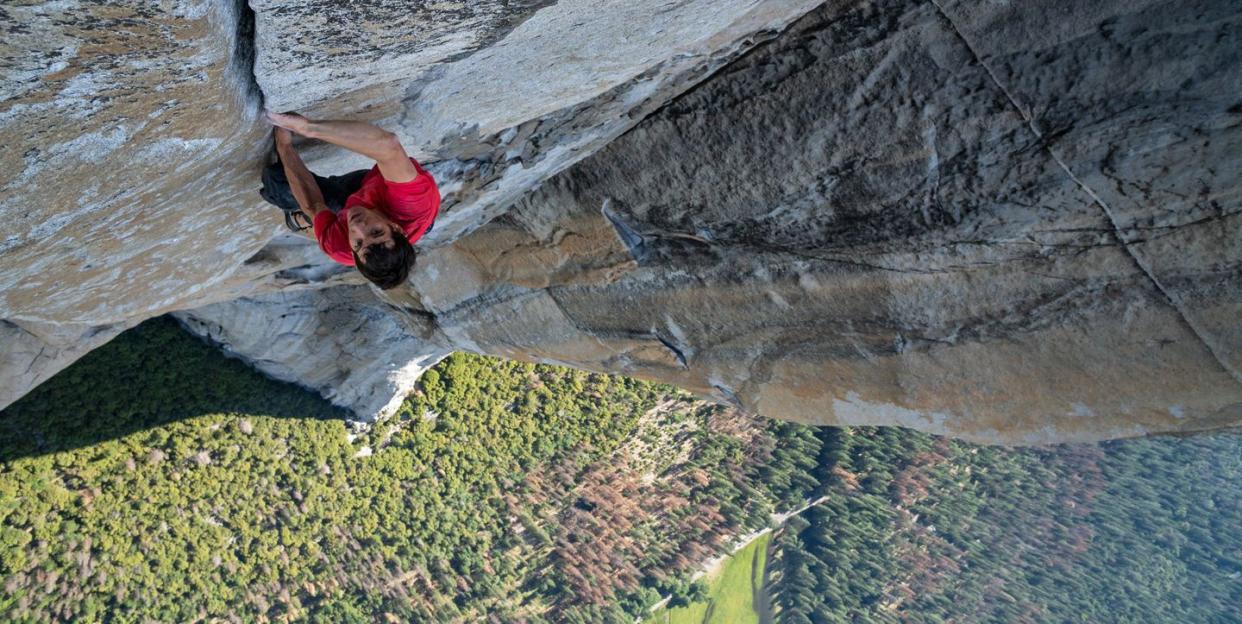
The best sports documentaries tend to be made by US film-makers, about US sports and athletes and the way life seems sometimes to connect to those pastimes in a deeper, more profound way than in other countries, even in the UK. Despite the best efforts of the BBC, BT Sport and a couple of lone feature film-makers, in this game, we're playing catch-up.
"The best films of this kind bring context," says Libby Geist, VP and executive producer of ESPN Films, who in 2018 oversaw 30 for 30, a season of films to mark the sports media titan's 30th anniversary. "People seem to think they know the stories, but a film-maker can step back and show reasons why and how, which the everyday narrative of sport often lacks."
Geist cites Senna (2010) as among her favourite films. Here, including that masterpiece, is our line-up of sports-doc excellence, including 2017 Bafta- and Oscar-winners Hillsborough and OJ: Made in America. They're three impeccable pieces of work that more than deserve their place in this, our round-up of the greatest sports documentaries ever made. Take a look at the others below.
Orient: Club for a Fiver (1995)
Directed by Jo Treharne
This is football's equivalent of that photo of people scrapping on the streets of Manchester which looks accidentally like a Renaissance masterpiece. This hour-long Channel 4 doc almost immediately became a meme in itself, with shards of Leyton Orient manager John Sitton's ravings making their way into football argot. The fly-on-the-wall cameras capture Sitton's attempt to keep a rapidly disintegrating Orient in the Second Division in the 1993/94 season, and his mental collapse on the way to failure: raging, growling, offering to fight his own team, sacking defenders at half-time.
On first watch it's utterly hilarious, but with the knowledge that this was a pivot point in Sitton's life it becomes something more profound and sad. After Club for a Fiver came out, he couldn't get a job in football and ended up driving black cabs in London for 16 years.
"I sold off a lot of personal belongings and some furniture to feed three young kids," he said in 2019. "The aftermath was like a bereavement. Anger, denial, and acceptance. You can throw into the mix embarrassment, as I know I’m better than that."
It's not streaming officially anywhere, but it occasionally surfaces; make sure you watch it next time you spot it. Or we'll have a right sort out in 'ere. Alright? And you can pair up if ya like. You can pick someone else to help you if you like, and you can bring yer fackin' dinner. Coz by the time I'm finished with you, you'll fackin' need it.
Fire in Babylon (2010)
Directed by Stevan Riley
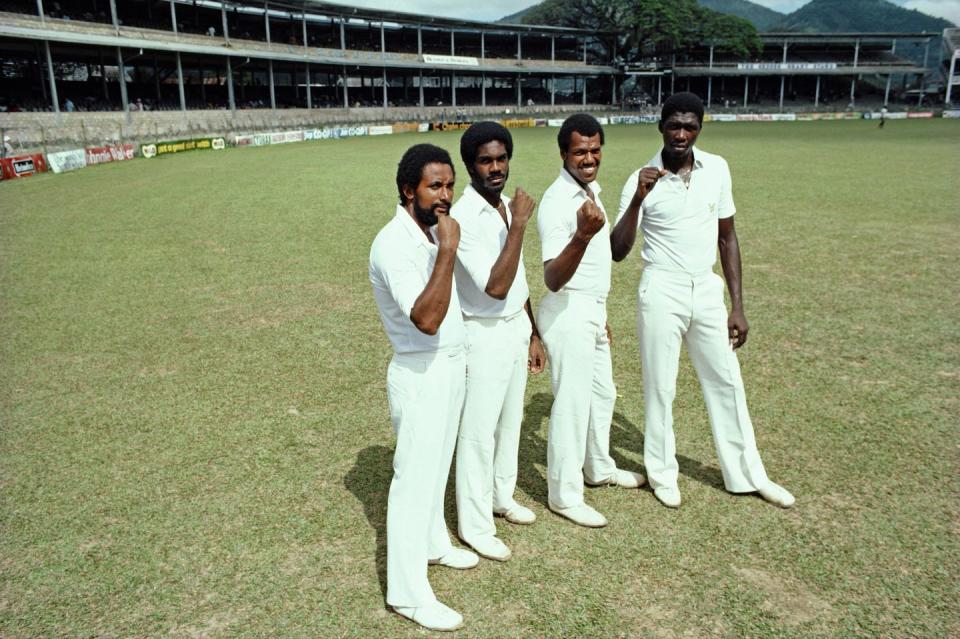
There aren't many sporting achievements to rank alongside the utter dominance of the West Indian cricket team of the Seventies and Eighties. Focused, merciless and outrageously talented, they swept all before them. They weren't just skilled, they were charismatic; not just brutal, but lyrical in their destruction of every team in front of them.
Before Clive Lloyd became captain in 1974, the West Indies had a reputation for being a freewheeling and joyous but fundamentally underachieving kind of team. Inspired by the fiery Australian pace bowlers Dennis Lillee and Jeff Thompson, Lloyd put his efforts into finding and developing his own quicks. Andy Roberts, Michael Holding and Colin Croft terrified batsmen the world over.
But that's only part of the story. Cricket's always at its most powerful when it reckons with the fact that it was exported to the world by English colonisers, who then found that the world very unsportingly became a lot better at it than them. The South Africa-born England captain Tony Greig's infamous promise to make the West Indian team "grovel" – which was extremely yikes-y even then – and the anger over a rebel tour to apartheid era South Africa are the heart of this one, which reaches a crescendo with the 5-0 'blackwash' series win in England in 1984.
Next Goal Wins (2014)
Directed by Mike Brett and Steve Jamison

It's the ultimate underdog story: American Samoa, the world's worst football team, try to qualify for the World Cup. Up to this point, Samoa hasn't been tainted by association with Fifa, and when we meet them they're still smarting from a 31-0 shellacking by Australia. (Honestly, Australia. Why be dicks to Samoa?) And while they're all absolutely lovely they are, to be fair, absolutely rubbish. In a bid to jump-start football culture on the islands, in comes Dutch-American coach Thomas Rongen to kick some arse and take some names. As the Samoan players – including Jaiyah Saelua, who's a fa'afafine, the third gender in Samoan culture, and became the first transgender player in a Fifa World Cup qualifier – adapt to Rongen's tactics, he and we learn more and more about the community and culture of Samoa. It's stirring and uplifting stuff. Wonderful, wonderful, wonderful.
Diego Maradona (2019)
Directed by Asif Kapadia
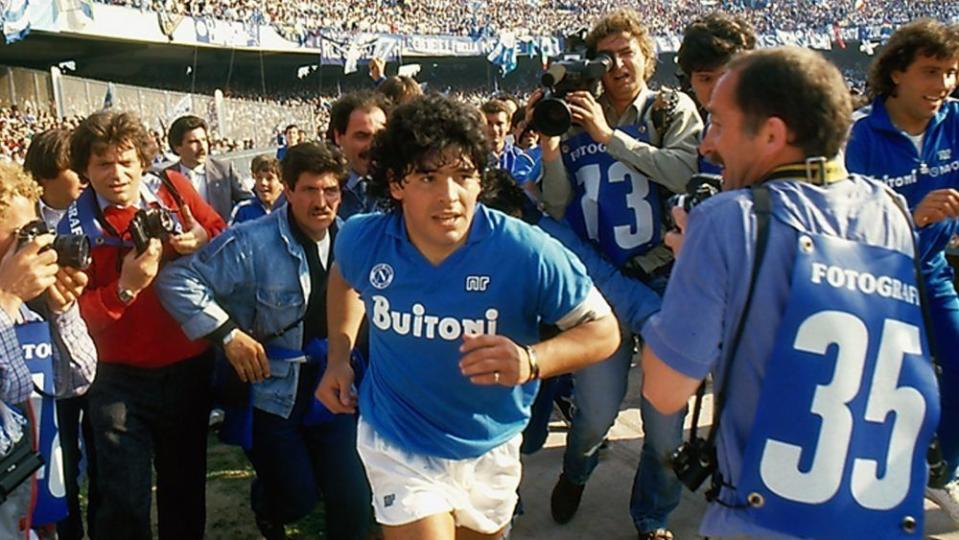
On the 25 November 2020, news broke that Argentinian football legend Diego Maradona – often considered to be the greatest player of all-time – had passed away at the age of sixty. The world grieved and paid tribute to an immensely brilliant, indelibly flawed man. His substance addictions and subsequent health problems had played out in the public eye since his playing days, but his death still came as a shock to the world; perhaps because he often felt larger than life itself. Around five years earlier, celebrated Senna director Asif Kapadia had set out on a mission to create a documentary that encapsulated why he was such a magnetic force for fans across the globe, and how he struggled to handle the power that fame provided him. The filmmaker even managed to get some extremely rare, surprisingly revealing interview time with the man himself. The story begins with the Argentine’s transfer to Napoli in 1984, which ultimately proved to be the most defining (and self-destructive) period of the player’s career: he reached enormous heights and inspired the city, but was soon dragged down into its seedy underbelly. Kapadia’s 2019 documentary is celebratory, melancholy, and a fine portrait of Maradona's many contradictions.
Athlete A (2020)
Directed by Bonni Cohen and Jon Shenk
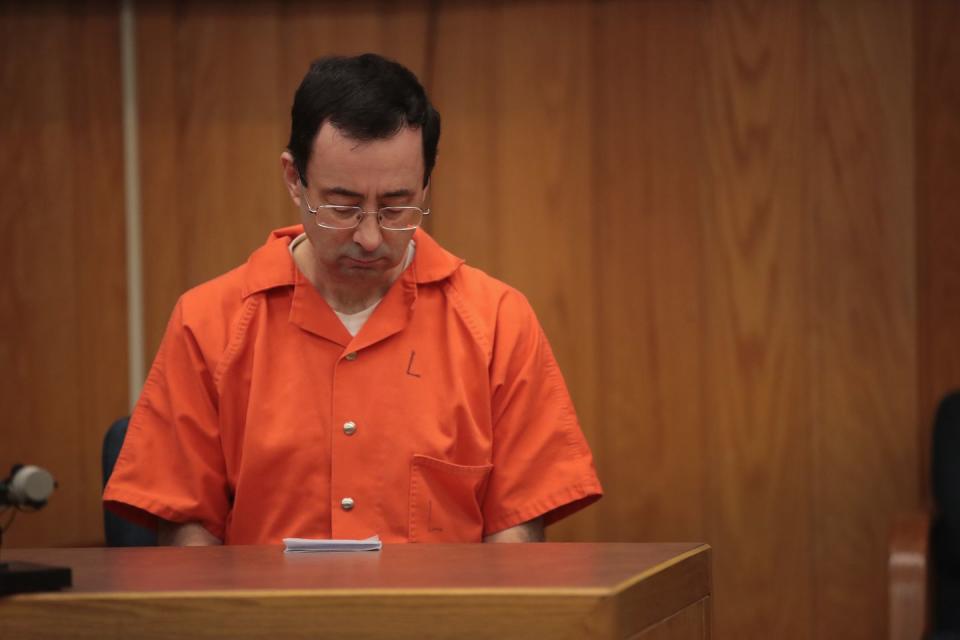
For over two decades, USA Gymnastics doctor Larry Nasser sexually abused young female athletes and faced no punishment, despite the many complaints that were registered against him. In the wake of his prosecution in 2016, over 260 young girls and woman have accused him of sexual assault, and Netflix’s Athlete A delves into the harrowing story of how a ring of institutionalised protection enabled Nasser to continue his crimes (54 coaches had also had allegations made against them across ten years). The film’s directors, Bonni Cohen and Jon Shenk, interview survivors and follow reporters from the Indianapolis Star newspaper as talk about their experiences shining a light on the organisational cover-up, as well as the dangers that exist within the American gymnastic system.
Free Solo (2018)
Directed by Jimmy Chin and Elizabeth Chai Vasarhelyi

The Oscar triumph of Free Solo might have been a surprise to some (it was vying against the pound-for-pound big-hitter RBG in the “best documentary” category), though probably not to its star, American climber Alex Honnold, who has a habit of succeeding at what he sets his mind to. Of course, the price of failure in his profession is a high one: Honnold specialises in free soloing – scaling sheer rock-faces without rocks – where one misplaced toe can mean plummeting to a spectacular and certain death. Film-makers Chin and Vasarhelyi were well aware of that, and that’s part of what makes Free Solo, which documents Honnold’s attempt to be the first to scale El Capitan in Yosemite Valley – so fascinating. The hesitations and fears of Chin and his crew, who appear in the film, serve as a kind of Greek chorus, necessary given that Honnold himself is a very particular character (as you might expect, given his chosen profession) for whom expressing emotion does not come naturally. To make his feat more difficult still, over the course of filming Honnold acquires a girlfriend, Sanni, whose sweet, questioning presence gives the film its depth: if Honnold isn’t solo, can he ever be free?
OJ: Made in America (2016)
Directed by Ezra Edelman

There's no doubt this epic retelling of the life and times of OJ Simpson is a milestone of documentary making. Dozens of interviews with all major players (except the headline star, who — spoiler alert — is up for parole this year), terrific work in the archives and admirable commitment to telling the most even-handed story possible. But to those whose knowledge of OJ runs to: "former NFL player acquitted of killing his wife and also in The Naked Gun", the film is a revelation.
Just some of the highlights: his relationship with the Black Power movement; his pioneering drive to turn sporting fame into mainstream, high-earning celebrity; his astonishing self-belief; his murder trial shifting from OJ versus The Man, to Black versus White in America; how the book If I Did It, his "hypothetical" account of the murder of his wife Nicole Brown Simpson and her friend Ron Goldman ended up being published by Goldman's father. And, in the frank, fearless, animated defence attorney Carl Douglas, you have the most magnificent talking-head in all of documentary.
Kicking & Screaming (1995)
Directed by Jean-Claude Bragard

The BBC's six-part history of English football is hard to find in full on YouTube and was last repeated in 1998. A talking-heads-and-clips classic, it draws a line from unregulated village-versus-village ball games, of the type that survives on bank holidays today, to the birth of the Premier League. It has a lot of little-seen footage, and an understated sense of humour. Scotland's Denis Law ends the episode about 1966 and all that: "I was playing golf in Manchester and, unlike Manchester, it was raining. There were two of us on the course. The guy I was playing with was awful. And he beat me. As we turned the corner of the course, all the members were at the window [of the clubhouse]. England had won 4–2. I thought it was the end of the world."
No No: A Dockumentary (2014)
Directed by Jeff Radice

A "no no", or no-hitter, is a baseball pitcher's perfect game, where no batter hits the ball. It's rare, with only 295 in US pro baseball from some 213,000 games. In 1970, Dock Ellis of the Pittsburgh Pirates says he threw a no-no against the San Diego Padres while high on LSD. (He'd partied hard and got his playing days mixed up.) This engaging film reveals more than mere debunking (or not) of myth.
An Impossible Job (1994)
Directed by Ken McGill

When Graham Taylor died in January, tributes said the former manager and pundit was one of football's true nice guys. The crew of the doc that almost ruined him would have recalled his good nature. In 1993, after filming Taylor's England World Cup qualifying campaign, they were banned by the Dutch FA from filming at the penultimate qualifier in Holland. Taylor helped smuggle them pitch-side in England tracksuits and with their gear in kit bags. (If only his team had been so adept at rounding Dutch defences.) The shots of Taylor on the touchline as England lose their chance to qualify are comically poignant. The film is full of such moments. Taylor's openness made him a laughing stock, his "Do I not like that" and "Can we not knock it" became catchphrases. This film practically killed the fly-on-the-wall sports doc and is all the more precious for it.
A Sunday In Hell (1977)
Directed by Jørgen Leth

Before cycling became a thing and documentaries on it became commonplace, this was the only one. It attained near-mythical status with fans who had to share it on VHS. Beloved, half-remembered films can lose their lustre over time, but A Sunday in Hell exceeds expectation. Danish director and poet Leth succeeded in his goal to distil heroism at the Paris-Roubaix, cycling's toughest one-day race, of 1976. Real pain emerges from grimacing, bloodied cyclists — the opposite effect given off by the machine-like road racers of today. The greatest cyclist ever, Eddy Merckx, is here, exuding Euro cool like Jean-Paul Belmondo on a bike. A subtle synth-and-symphony score is 40 years ahead of its time. Rivalries and team bonds, only briefly noted in the spare voiceover, are shown to be genuine. One of very few films to convey how hard and noble pro sport can be.
Tyson (2008)
Directed by James Toback

There's only one talking head punctuating clips in this film. It has a Maori warrior-like tattoo on its left side and the words coming from the mouth are measured and softly spoken. It is, of course, Mike Tyson, giving thoughtful and honest comment on his rise to, tenure as, and fall from heavyweight champion of the world. Toback does a grand job of mining archives for news and fight footage. Seeing Tyson in action can still raise a gasp, thanks to his unsurpassed power, speed and skill. Toback had been friends with Iron Mike for 20 years when they made this, so he can ask about Tyson's rape conviction or "colourful" ex-manager Don King.
The Gambler (2000)
Directed by Paul Wilmshurst

"Hello, I'm Jonathan Rendall and Channel 4 have given me £12,000 to gamble with. I'm looking forward to it." So begins a quietly brilliant three hours in the company of British sportswriting's great wayward talent, a man described as Keith Floyd crossed with Hunter S Thompson and a known betting enthusiast (C4 funded him in the wake of his book, Twelve Grand, about punting the titular amount). Understated shabby English charm is his stock-in-trade, all second-hand coats and Silk Cut. He wagers his way from his local bookie in East Anglia to boxing in Peterborough and London casinos, then Australia, Macau, Hong Kong and Las Vegas, shining valuable light on gambling. Rendall, who died in 2013, absolutely personifies the misplaced romanticism that makes a winning bet so beautiful and a losing one so horrible. The highs and lows of the gambling life are seen unvarnished and seem very real, despite our hero using the best kind of stake money — someone else's.
Freedom's Fury (2006)
Directed by Colin Keith Gray and Megan Raney

Quentin Tarantino was pitched the idea for this movie and immediately signed on as investor and executive producer. He told the makers they had one of the greatest stories never told. The 1956 Olympic men's water polo knockout match between Hungary and the USSR, effectively a semi-final, took place a few days after the Hungarian people's rebellion against the Soviet-controlled regime had been quashed. Revenge, pride and passion are only the half of it, and when surviving players are reunited half-a-century later, you know exactly what Tarantino meant.
Hoop Dreams (1994)
Directed by Steve James

The Citizen Kane of sport documentaries. Almost everyone who has made one since lists it among his or her influences. It was truly ground-breaking in format and content. A film crew spent five years in Chicago with two schoolboy basketball prospects and their families, to craft a near three-hour film with a range and depth of insight simply not seen before. Since then, of course, the story of the kid trapped on the wrong side of the tracks with sport as their means of escape has been told many, many times, but there hasn't been a film that takes the viewer into that world so fully. Hoop Dreams retains all of its emotional and dramatic power, and has perhaps even gained some over time. Watching it now, you realise that no one is putting forward the version of themselves they feel they need to be on camera — an impossibility with the rise of reality TV in the last 10 years.
McConkey (2013)
Directed by Steve Winter, Murray Wais, David Zieff, Scott Gaffney and Rob Bruce

The sub genre of ski and snowboard films is notable mainly for wild landscapes and outlandish stunts. This film, although sharing a little of that DNA, is an outlier, because it has genuine emotional pull and ranges beyond extreme sport into something far deeper about human endeavour and the search for happiness, wherever you look for it. Shane McConkey was a skier who graduated into base-jumping, and pioneered a combination of the two, skiing off mountains and deploying his parachute at the last second. He was also a husband and a father; reconciling family and work is just one conflict in his unique life. Home video of his younger years draws you immediately close to the subject. McConkey is highly likeable, not the high-fiving brah you might have suspected him to be. Thus, the film's last act is far more poignant than you'd bargained for.
Hillsborough (2016)
Directed by Daniel Gordon

This 30 for 30 film (first shown in America in 2014) won the 2017 Bafta for Best Single TV Documentary. Very hard to watch at times , it goes into great detail about the disaster and the institutional cover-up that followed. It became a forum through which many associated with the events, including Esquire contributing editor Dan Davies, who was there, to speak publicly for the first time about what they experienced. These include policemen, many of whom, on a human level, could be considered victims of their bosses' malfeasance. This could only be shown in the UK after the verdict of the second coroner's inquest in May 2016; director Gordon used the same footage of the day shown to inquest jurors. The 2016 UK version adds the unlawful killing verdict, to make the definitive chronicle of British sport's darkest hour.
Deep Water (2006)
Directed by Louise Osmond and Jerry Rothwell

The 1968–'69 Sunday Times Golden Globe Race was notable for many things, not least that it was the first round-the-world yacht race. Of nine starters, only one finished. Another, a likely winner, decided that competition was not for him and carried on sailing on a new course, for a total of 10 months at sea and another two-thirds of a circumnavigation. Then there was Donald Crowhurst. If the name is not familiar, do not Google it and instead track down Deep Water. Crowhurst's story deserves to be called "astonishing" (a biopic, The Mercy, starring Colin Firth is due in autumn) and this film tells it superbly: part biography, part mystery, part underdog tale. A brilliant example of the parallel world where fact trumps fiction on film.
When We Were Kings (1996)
Directed by Leon Gast

Last night, I cut the light off in my bedroom, hit the switch and was in the bed before the room was dark." "Only last week, I murdered a rock, injured a stone, hospitalised a brick! I'm so mean I make medicine sick!" To listen to Muhammad Ali when his mind and body were at their peak is as special as seeing them in action in the ring. When We Were Kings was the first time the two were seen together at length, in a film showing The Greatest in the run-up to, and during, The Rumble in the Jungle against George Foreman in what is now the Democratic Republic of the Congo in 1974. Fight highlights are extensive and there's music from a simultaneous festival, Zaire 74. Ali talks about freedom and the African-American condition, while earning $5m for a bout in a country run by a murderous dictator. The best film yet on the best-ever sportsman.
Senna (2010)
Directed by Asif Kapadia

Kapadia raised the bar for all docu-biopics, not just sporting ones, with his recounting of the life of Ayrton Senna. By only using archive footage and adding no captions or talking heads, he wired audiences directly into the racing driver's private and public moments, rather than keeping them one step removed as onlookers. It helped that Senna's life was special and tragic, but with no pauses for analysis or after-the-fact context, the film is totally enthralling from the first moment to last. Kapadia went on to make Amy, about singer Amy Winehouse, in 2015 and is currently in production on a life of Diego Maradona, with full support and access to the man himself and his home movies. An exciting prospect, but it will have to go some way to match the searing brilliance of Senna.
The Two Escobars (2010)
Directed by Jeff and Michael Zimbalist

Arguably the outstanding episode in ESPN's outstanding 30 for 30 series, it tells the tale of two unrelated men who shared a surname and an inability to escape Colombia's drug culture. Pablo Escobar created a huge cocaine empire. Andrés Escobar was an elegant centre-half for Atlético Nacional and the Colombian national team, who was shot dead on the orders of a drug baron — not Pablo — after Colombia went out of the 1994 World Cup. Using amazing footage from Pablo's archive and strong investigative work, the directors make the case that Andrés and Colombia were only at that World Cup because of Pablo's investment in Atlético and Colombian football at large. In the late Eighties, Pablo and two rival barons effectively owned the country's three largest club sides. Fan grumbles about clubs owned by Indian chicken processors and Chinese holding companies can only pale in comparison.
Premier Passions (1998)
Directed by John Alexander

Twenty years ago, a BBC film crew decamped to Sunderland to record a year in the life of the club, then, as now, yo-yoing in and out of the Premier League. They got full access: boardroom, dressing room, treatment room, terraces, team coach, fan coach. The five-part series had to be shown after the 9pm watershed because bleeping out the fucks would have turned the soundtrack into an Aphex Twin album. Anyway, football wasn't fun for all the family back then. Another trait of modern football, the idea of the "football family", is central to the film's success. The sense that everyone connected to a football club is connected to everyone else, which supporters in particular hold dear, is palpable. There are other football-club fly-on-walls (City!, about Manchester City in 1980–'81; Club for a Fiver, about Leyton Orient, in 1994–'95) but none as comprehensive or enlightening as this.
Dark Horse (2015)
Directed by Louise Osmond

Sport is filled with underdog stories, but here's a doozy. A barmaid and supermarket worker in a former Welsh mining village convinces two dozen friends and neighbours to join her in a racehorse syndicate. They raise £300 to buy a thoroughbred mare, hire a stallion to do his thing, and Dream Alliance is born, raised on an allotment, put into training, then wins the Welsh Grand National. Dark Horse is not a rags-to-riches story in the strictest sense, because despite the race success, Jan Vokes and her syndicate do not receive material gains. They are altered immeasurably, however, by their realisation that life doesn't have to be boring and that being part of something bigger than yourself is its own reward. Rocky meets The Full Monty in real-life: who wouldn't want to see that?
Undefeated (2011)
Directed by Daniel Lindsay and TJ Martin

As fans of TV's Friday Night Lights know, high-school football is where the good stuff lies, where dreams are made and shattered, where talking to God and listening to Coach are the only rules of the locker room. This is the IRL version of that drama, which won an Oscar for Best Documentary Feature. "Football does not build character," says Bill Courtney, coach of the Manassas Tigers, "it reveals character." This film does the same, via young men from a forgotten Tennessee town and Courtney, who might just be an answer to a pre-match prayer. At one point, the team's wildest wildcard, who'd missed the previous season because he was in juvie, gives an impromptu speech praising a teammate he'd hit a few weeks prior. You can tell it's the hardest thing he's ever done, and that playing for the team has changed him for the better. If your eyes remain dry, there is something wrong with you.
Touching the Void (2003)
Directed by Kevin MacDonald

A once-in-a-lifetime story that became a truly great non-fiction film, Touching the Void was nevertheless controversial for its many re-enacted scenes and so, for some, is not a true documentary. But how can you show something that really happened if there was no camera there? It's the "pics or it didn't happen" argument, long before Instagram, and the solution is: make the pics and stay true to the story. The film also asks every viewer a question they can't ignore, "What would you do in this situation?" and that only makes it more compelling. The situation is two climbers, one with a broken leg, dangling from a rope on a mountain in Peru, with no water, no fuel to melt snow for water and bad weather closing. Both will die unless the injured man is cut free, giving the uninjured man the chance to get help. You are the uninjured man, knife in hand. What would you do?
Tokyo Olympiad (1965)
Directed by Kon Ichikawa

A more widely-known documentary of an Olympics is Olympia, the controversial record of the 1936 Berlin games directed by Leni Riefenstahl, Nazi propagandist. More impressive and revealing is this film of the 1964 Tokyo games, commissioned by the Japanese government who gave permission to film anywhere, rather than the IOC, who would not. So this is a loose, almost expressionistic take on sport and sportspeople, devoid of easy heroism and official pomp. You get the broken athletes at the back of the marathon, as well as the leaders. There are close-ups of kit and body parts. There's no story, just snippets of competition and some organisational stuff. The lack of sponsor names makes it seem 100 years old, never mind 50. Seeing sport get the art-house treatment is rare and splendid.
WATCH
The Last Dance (2020)
Directed by Jason Hehir
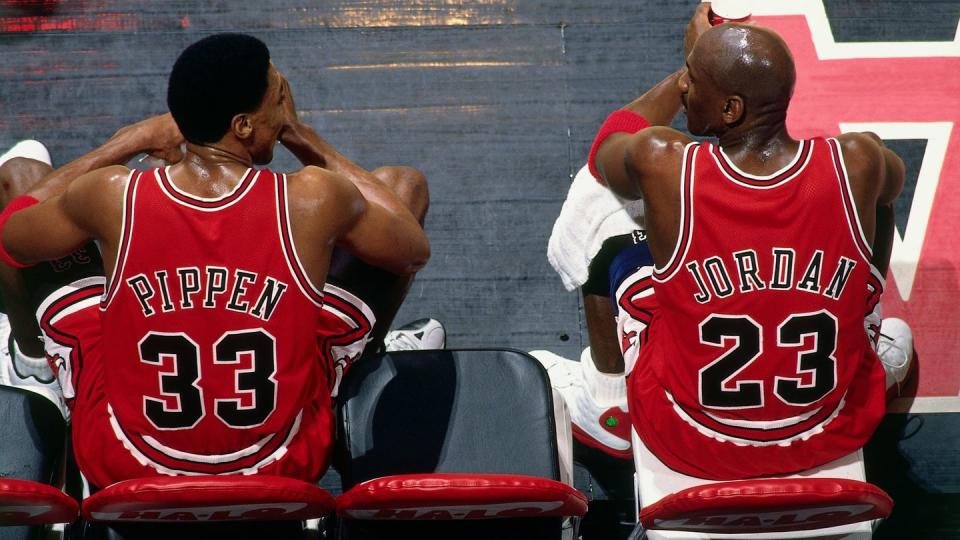
If Netflix’s timeline-hopping Chicago Bulls documentary The Last Dance watches like a hagiography, that’s because it kind of is one. Michael Jordan, a man who understands the power of good marketing better than almost anyone, reportedly had final approval over what made it in. But even then, it still struggles to convey just how important the legendary NBA star was to his team, his sport, his country, and to popular culture in general during his Nineties heyday.
The Last Dance centres on Michael Jordan’s final season at the Bulls, and their attempt to win an unprecedented sixth title in eight years. Director Jason Hehir regularly time-warps into the past, however, to cover all of the trials, tribulations and celebrations of previous campaigns. His teammates all have fascinating and touching stories to tell (especially, it goes without saying, Dennis Rodman), but the focus never moves too far away from Jordan; from his prodigious talent, his dogmatic determination, from his fire and anguish. All in all, we’re left with a awe-inspiring portrait of a truly complicated man who took advantage of his flaws to reach perfection, as unrelatable as he is distinctly unlikeable at points. We also watch as one man turns himself into a global, money-spinning brand, with blockbuster movies and best-selling sneakers to his name, forming a new celebrity industrial complex in his fleet-footed wake.
Like this article? Sign up to our newsletter to get more delivered straight to your inbox
Need some positivity right now? Subscribe to Esquire now for a hit of style, fitness, culture and advice from the experts
You Might Also Like

 Yahoo Movies
Yahoo Movies 
